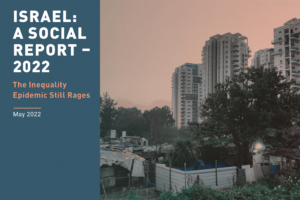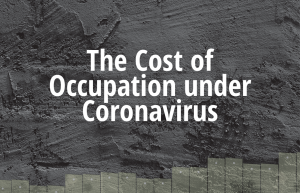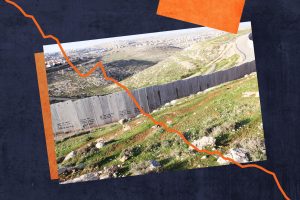48 Years of Military Occupation of the Palestinian Territories: Israel’s Self-Imposed Socio-Economic Burden
The socio-economic cost of the conflict receives far less attention than its cost in human lives and its political implications. And when the issue of socio-economic cost does arise, political leaders hasten to point out that these costs are relatively low and that their negative effect on the Israeli economy is short lived. This position contributes to entrenchment of the feeling that the conflict can be “managed” and does not call for any special effort to come to a political settlement. Education Minister Naphtali Bennett gave this notion an arrogant yet representative expression when he contended that the Palestinian problem was like a “piece of shrapnel in the backside” that did not need to be extracted as one could live with it. In contrast, the Adva Center contends that this approach is self-delusionary and that Israel’s society and economy are paying a heavy price for the continuation of the conflict. Below are some of the major points covered in the report:
The absence of economic stability: Without a political solution, the Israeli economy remains vulnerable to instability. Harm is done to economic growth, to investments, to trade, and to tourism, and workdays are lost as a result of frequent hostilities. The image of Israel as a stable economy that is safe for investments is also adversely affected. While it is true that during the past decade Israel’s GDP per capita grew at rates comparable to those of Germany and the United States, this is really no consolation, as GDP per capita in those countries is much higher than that of Israel. If Israel is to emulate the standard of living of Western countries, it needs to grow at a higher rate than theirs for an extended period of time. However, frequent hostilities with the Palestinians make this difficult to achieve.
Credit rating: The conflict hampers Israel’s credit rating, which is relatively low. If Israel ranks 19th among 187 countries according to the UN Human Development Index – a very respectable position – it is ranked 30th by the credit rating agency Standard and Poor’s.
Threat of boycott: If in the past Israel’s political leaders tended to belittle the dangers of the international boycott movement, the situation appears to have changed. In January 2014, then Minister of Finance Yair Lapid warned, “If negotiations with the Palestinians falter or break down and we are boycotted by Europe, even partially, Israel’s economy will experience recession, every Israeli citizen will be directly affected economically, the cost of living will increase, education, health, social welfare and defense budgets will be cut and many international markets will close their doors to us.” Prime Minister Benjamin Netanyahu finally recognized the threat of boycott when he appointed Minister of Internal Security Gilad Erdan to deal with the issue in May 2015.
Neoliberal policies on one side of the wall: Since 1985, Israeli governments have consistently promoted neoliberal policies involving budgetary restraint and reduction of the share of government outlays in the economy. However, these policies stop at the Green Line: during all the years of Israel’s occupation of the Palestinian territories, the state has been the dominant actor in the development of Jewish settlements there. Israeli governments engaged in activities ranging from land allocation and the construction of living units, to providing infrastructure and roads and setting up industrial parks, to surplus funding of social services that guarantee the settlers a high standard of living.
Government funding of municipal budgets: A clear example of differential government treatment on the two sides of the separation wall is the degree of government participation in the budgets of local authorities. Between 1991 and 2012, the highest per capita government grants (mainly for education and social welfare services) were made in the settlements: in 2012, this amounted to an average of NIS 2,695 per resident, in comparison with NIS 2,277 in Arab localities inside the Green Line, NIS 1,892 in Jewish development towns, and NIS 1,684 in “Forum 15” localities (affluent cities with balanced budgets). The same can be said for government balancing grants, which amounted to NIS 1,015 per capita in the settlements, compared to NIS 885 in Arab localities within the Green Line and NIS 671 in Jewish development towns.
Construction at Public Initiative: Another example of the disparities between central government spending in the settlements and in localities within the Green Line has to do with building initiatives. Within the Green Line, for at least two decades, Israeli governments have transferred responsibility for housing to the private sector. However, in the occupied territories the state continues to be actively involved in housing, as reflected in the percentage of living units built there as a result of public initiative. In the course of the 1990s in the district of Judea and Samaria (a district which until 2005 included the Gaza Strip as well), the proportion of construction under public initiative was higher than 50%. In 2000 there was a light decrease in the proportion of public construction, but it remained higher than in the districts on the other side of the separation wall.
Socio-economic agenda: The conflict conquered the political agenda in Israel; thus, one’s approach to the conflict defines the political position of individuals and political parties more than their approach to social and economic issues. Serious socio-political issues like Israel’s high poverty rate are simply relegated to the margins whenever a violent confrontation occurs. One salient recent example among many: Prior to the “Protective Edge” campaign, the recommendations of the Allalouf Committee to Combat Poverty constituted a major public issue. Two weeks after the start of the campaign, it was announced that the discussions scheduled with the Minister of Finance on financing those recommendations had been cancelled due to the hostilities.





